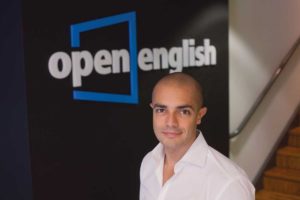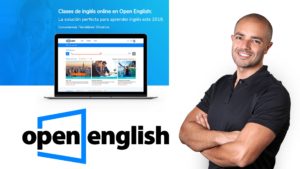The founder of OpenEnglish, Andrés Moreno, has reasons to be proud about: he has a ten-year-old venture that raised a capital of US $ 125 million. In addition, he has just been appointed as co-director of the accelerator Endeavor Miami Advent International which aims to generate revenues of US $ 500 million in the region, in the next five years. AméricaEconomia interviewed him about entrepreneurship, the future of education and online business in the region.
- Today you got to promote entrepreneurship in the region and the USA, as co-director of Endeavor Miami Advent International. How this new role contributes to open this financial ecosystem to Latin entrepreneurs?
This business environment, in the city of Miami, is a reality that I already know very well, because I have already been participating in entrepreneurial cycles for more than six years. Today, we already have a group of entrepreneurs and important companies to support, but we seek to increase that number in a short time. Today, Endevour has become the main piece of the entrepreneurial ecosystem of the city of Miami, which has allowed, by the way, the landing of many Latin American initiatives. We play an introductory role for new businesses of Latin origin, because many of the projects that seek financing and implementation must pass through this city.

- What is your analysis of the moment of entrepreneurship in the region and how does it compare to the experience of being at the head of OpenEnglish?
I think that question can explain a lot about entrepreneurship in the region. Currently, it is notorious that it was easier to start and build companies ten years ago, when we opened up OpenEnglish. It is a good pass that today allows to find varied funds that accelerate ideas.
In the good times twe live today as for the entrepreneurship, there is a possibility that capital raising will be easier. When we started, in Latin America the uprising was almost impossible. Moreover, you had to leave the country or the region to see how the attraction of this financing could be given. And if the company was about technology, captivating became even more uphill.
- Today, the resistance to investing in technology businesses has changed radically.
Certainly, since the issue of technology, associated with business, it was a bit complicated when it came to putting into practice or making sense to the entrepreneur. Today there is much more sophistication about it. But one thing that attracts the attention in the region is the increase in capital investors in the early stages of a company, where we can find strong investments that minimize the time to launch the projects, and along with that, be able to give a much faster internationalization.
For example, when we left OpenEnglish, the servers where we stored our information were in an office as gadgets. All that data is stored in the cloud more securely. It is much simpler and the change aims to improve business efficiency.
- Let’s look at your company. Tell us about the evolution of OpenEnglish until its consolidation.
I believe that we have come to a scale that we did not imagine at the begining. Today, we are in more than 20 countries throughout Latin America. We have been able to install different business verticals, in order to integrate more visions, and several of them are under what we call “open education”.
Under that platform we already group classes for adults, which are the best known, but we have also joined the junior sector with the inclusion of online classes for children. Thus, our big bet is the digital university that we are promoting, with great growth in the region: there are already more than 19 digital careers such as marketing, digital development and mobile applications. There are more than 45 thousand students participating. This consolidation of the business has also been thanks to the advancement of technology. The one, without the other, would not have been possible.
Hybrid learning process
- The success of online education, and also the success of OpenEnglish, in a continental level, has boosted similar digital initiatives. How do you handle the pressure of being at the forefront, of leading the way?
Whenever a company has a product on the market that becomes very successful, there will be other companies that want to replicate that success. But as the market has been expanding in the possibilities of attending many more digital solutions, including studying online – a trend without return – the market allows the inclusion of other players, the coexistence of more experiences than they can bring to target audience.
We are already investing in new businesses that help us increase higher customer targets. They have not arrived yet, but the installation of OpenEnglish physical schools in South America will soon be implemented.

- And why does a company with ten years online today turn around a physical infrastructure, such as that of the competition, to which they always wanted to keep distance?
That is a good question. We have said and spread, from the beginning, the benefits of studying online and that methodology for more than ten years. But with the passage of time and with the expansion of our business we could realize that there is a segment of the population that still does not achieve the necessary connectivity or the discipline of studying online, so we began to design a very exciting concept: hybrid learning centers, where you can study online or offline.
In the case of hybrid centers, when the user enters the OpenEnglish center it will be very similar to a high-tech store or similar to the experience of entering an Apple store. Everything will work with a QR code that identifies you, gives the information of your personal data, the assigned classes, your proficiency, the room for your classes. All this through a series of processes that will offer a service that is accompanied by a lot of technology.
- Is this new line of business a response to the criticisms of the classic universities or educational entities that provide language education, about its format and quality of online teaching?
Quality is a very important issue when talking about education and online teaching. And I believe that consumers end up being quite intelligent in this regard: brands or companies that are not of good quality leave the market; and the companies that offer quality services are those that prevail, not only in the market, but also in time.
- You have just made an acquisition in Chile. What is the purpose of the purchase of an Artificial Intelligence (AI) company?
We are in a constant search for new technologies. Tools that not only improve our current services, but also the possibility of experiencing new lines of business. Because the success of our company is at the same time our greatest threat, since you always have to maintain a very high quality level.
With information from Agencies


